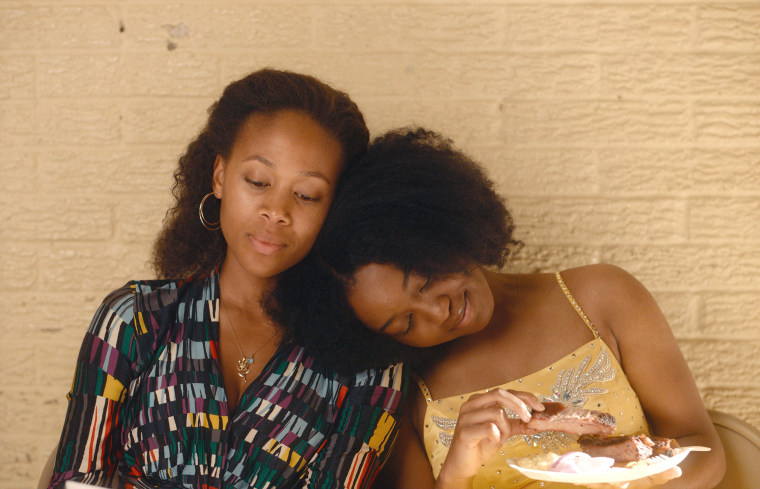Channing Godfrey Peoples' debut feature film, "Miss Juneteenth," is a sharp and nuanced depiction of Black womanhood, unpacking the sacrifices and aspirations of women from generations long past and connecting them to the Black women of today. Set in Fort Worth, Texas, Peoples turns her lens on Turquoise Jones (an exquisite Nicole Beharie), a former beauty queen turned single mom who is determined to provide her 15-year-old daughter, Kai (Alexis Chikaeze), with the opportunities that once slipped through her grasp — via the annual Miss Juneteenth pageant she herself once won and which she believes represents Kai's ticket to a more comfortable life.
Juneteenth — "Freedom Day" as it's also called — commemorates the anniversary of the Union Army's arrival in Galveston, Texas, in 1865, letting the enslaved people know that they were free and that the Civil War had been officially over since April. As celebratory as the day was, and still is, for many Black Americans, it was also bittersweet: Slavery had formally ended in the United States two and a half years prior, when President Abraham Lincoln's Emancipation Proclamation became official on Jan. 1, 1863.
Juneteenth, then, represents not just freedom but a freedom delayed.
Like Juneteenth itself, Turquoise is desperate to celebrate a belated release both from the woes of her life and the allure of the paths not taken through her daughter ... and the crown she hopes her daughter will wear.
Though the beauty contest at the center of "Miss Juneteenth" has some of the same structures as a traditional beauty pageant — a talent show, proper etiquette, a ball gown — it is also designed to offer a space for young Black women who were historically barred or overlooked in traditional pageants to compete, as well as enable them to learn more about their history while potentially earning a scholarship to a Historically Black College or University.
Turquoise, of course, didn't end up using the scholarship; as Beharie noted to me in an interview, "The timeline of when she got pregnant and all those things aren't necessarily explained." And, for Kai, the pageant's etiquette classes and respectability politics — and perhaps even the scholarship — feel nothing like freedom or a future she wants. "Why you making me do it?" she asks her mother at one point. "It didn't do nothing for you."
Turquoise did once don the Miss Juneteenth crown proudly, and sought to use its powers to better her own life. Unfortunately — as has been the case for many Black women across history and certainly in films — the dreams she once held tightly have been sharply deferred, and so she has focused all of those hopes and dreams on Kai. "I've seen so many women in my own experiences pour everything into their kids," Beharie explained. "It's overspend, and that definitely is the case here"
"It feels like it's just about this lady in Texas, but it's about so many of us who, whether we have children or not, there's a future that we want to see come to fruition," she added.
Films like "Miss Juneteenth" are refreshing because they don't present their audience with a detailed guidebook for white people into Black womanhood; you're either familiar with Turquoise's world, or you're not. We watch Turq press out Kai's hair despite the dizzying Texas heat; we see Kai's face light up when she speaks of the marching band exhibition Battle of the Bands.
Though from the time the medium was invented, Black women have been there, both on and off-camera — from Oscar Micheaux, who was the first Black director and featured Black actresses like Evelyn Preer and Iris Hall in his "race" films in the 1910s and 1920s, to Lena Horne, Josephine Baker and Dorothy Dandridge (the first Black actress nominated for a best actress Oscar, for 1954's "Carmen Jones") — it wasn't until the 1970s that Black female-centered stories finally began appearing in Hollywood. "Lady Sings the Blues" (1972), "Claudine" (1974), "Foxy Brown" (1974) and "Mahogany" (1974), gave audiences rare glimpses into the Black female experience.
It should have been a watershed moment — but it wasn't.
In the decades that followed, Black women still had to fight to get their stories to the big screen, whether it was Kathleen Collins' "Losing Ground" (1982), Julie Dash's "Daughters of the Dusk" (1991), Leslie Harris' "Just Another Girl on the I.R.T." (1992), or Kasi Lemmons "Eve's Bayou" (1997). Other films, like "The Color Purple" (1985), "Crooklyn" (1994) and "Waiting To Exhale" (1995), were based on source material written by women — but were directed under the male gaze. Black women only truly began gaining ground both in front of and behind the screen in 2012: That year, Kerry Washington stepped into Olivia Pope's stilettos on ABC's "Scandal," and Ava DuVernay became the first Black woman to take home Sundance's directing award for "Middle of Nowhere."
Now, when the world as we know it is exploding, and Black women are screaming at the top of our lungs to be heard, "Miss Juneteenth" is a gift. Using an oft-forgotten holiday and a youthful-but-stoic former beauty queen, Peoples' "Miss Juneteenth" puts the complexities of being a Black woman back in our hands. "That's the part I never would have imagined a year ago when we did this, that we would be in this moment as 'Miss Juneteenth' is coming out," Beharie told me.
Black women are now showing the world that there will be no more silence from us, either in real life or on screen. It's just as Turquoise tells a would-be suitor, who is desperate for a romance for which she has no passion, "I just want something for myself." It’s past time Black women tell our stories, just for us.





